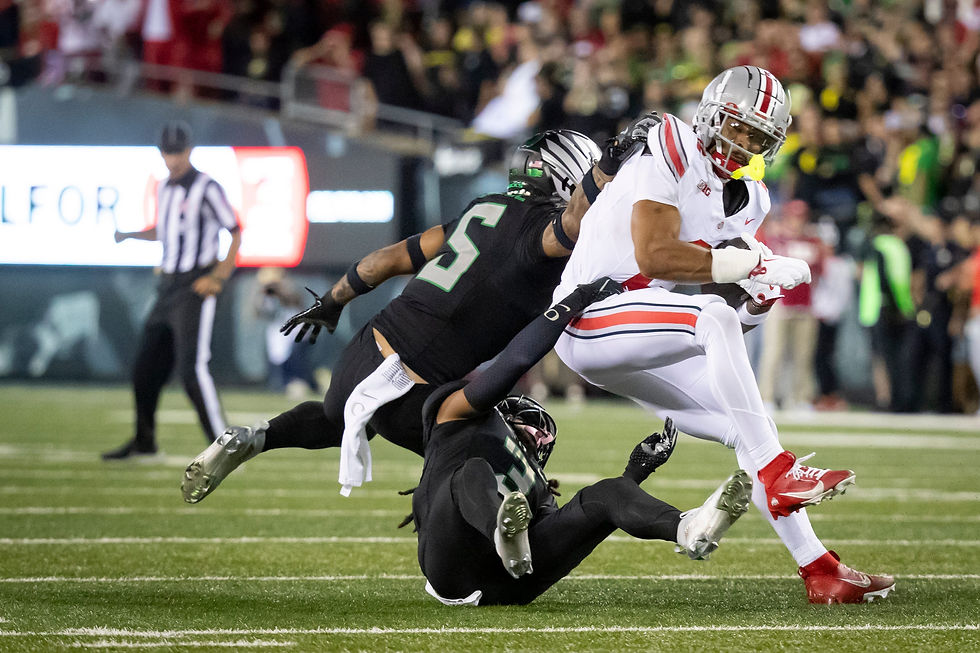CFP Needs an Oregon Win to Avoid Collateral Damage
- Mike Germanese
- Dec 28, 2024
- 4 min read

A negative narrative has arisen around the 12-team College Football Playoff and, as a result, the CFP selection committee's reputation and authority will suffer a significant setback if the No. 1 Oregon Ducks (13-0) lose to the No. 6 Ohio State Buckeyes (11-2) on Jan. 1, 2025, in the Rose Bowl. An Oregon loss would cause collateral damage affecting both rivalry and championship games and the perceptions of such games moving forward.
The problematic layout of the playoff bracket has given rise to questions concerning the significance of regular-season success.
Although the first round of the college football playoff has come and gone, debate continues about whether the selection committee selected the right teams. Fans anticipated and hoped for competitive first-round games, but all four matchups were disappointing, uncompetitive affairs.
With the second round approaching fast, the committee faces increased scrutiny. Will the quarterfinals live up to the hype and ease the pressure on the CFP decision-makers?
Here are the quarterfinal matchups:
Dec. 31, Fiesta Bowl, Penn State vs. Boise State
Jan. 1, Peach Bowl, Texas vs. Arizona State
Jan. 1, Rose Bowl, Oregon vs. Ohio State
Jan. 1, Sugar Bowl, Georgia vs. Notre Dame
While upset victories by No. 9 Boise State (12-1) or No. 12 Arizona State (11-2) would not enhance the negative narrative swirling around the committee, a loss by the top-ranked Ducks would enhance the negativity and engender collateral damage throughout the college football landscape.
Negative Narrative
After the lopsided first-round games, prominent commentators questioned whether the playoff selection committee included the wrong teams in the 12-team field. Issues about picking the most deserving teams or best teams arise every year, and this season was no different.
ESPN analyst Paul Finebaum criticized the committee's selections, sarcastically suggesting its members should "[t]ake a bow."
Kirk Herbstreit and other prestigious and well-known observers took to the airwaves to express similar sentiments.
Collateral Damage if Oregon Loses
Although Oregon triumphed over Penn State in the Big Ten Conference championship game on Dec. 7 in Indianapolis, the Nittany Lions received a more favorable draw than the Ducks in the CFP. (While the Buckeyes are favored by 2.5 points over the Ducks, the Nittany Lions are favored by 10.5 points over Boise State.) This circumstance has prompted college football observers to question whether teams might seek to opt out of conference championship contests in the future or strategically "play to lose" in such matchups.
Imagine Oregon losing to Ohio State and Penn State advancing to the championship game. If that comes to pass and if the current CFP seeding structure remains intact, teams may view 5-to-8 seeds as more advantageous than 1-to-4 seeds even though top-4 seedings come with first-round byes.
Looking at the current bracket, it appears Penn State benefitted from its conference championship loss to Oregon despite the Ducks' first-round bye. While Oregon has a conference championship under its belt, if Penn State or Ohio State wins the national championship who will remember Oregon won the B1G title? Aside from Oregon fans, probably not many.
Thus, as currently formatted, the 12-team CFP devalues winning conference championships. The criticism of this system will escalate if the Ducks are ousted by Ohio State in the Rose Bowl.
Undercutting Rivalry Game Significance
On Nov. 30, in the 120th iteration of "The Game," the unranked Michigan Wolverines (7-5) stunned Ohio State with a 13-10 upset victory in Columbus, Ohio. After the Wolverines handed the Buckeyes one of the most embarrassing losses in the storied rivalry's history, much of the Ohio State fanbase called for coach Ryan Day's termination. It was the Buckeyes' fourth consecutive loss to the Wolverines. But, less than a month later, Ohio State has moved on to the CFP quarterfinals, and Day has responded to the calls for his job by inspiring belief that his team can win the national championship. In this regard, the CFP threatens to undermine the significance of rivalries like that between Ohio State and Michigan.
For fans and programs, the feeling of a win or loss in a big rivalry game used to endure for 365 days. Now, however, such a feeling can be transitory and fleeting if one or both of the teams participate in the CFP after the rivalry game. In contemporary college football, pursuit of a national championship is prioritized over besting a rival.
Ohio State can alter the manner in which the outcome of their biggest game is viewed by winning three games in the CFP. Indeed, if the Buckeyes go on to beat Oregon and win a national championship, the sting of their fourth straight loss in “The Game” will be ameliorated if not removed altogether. An unfortunate consequence of such a result would be minimization of the passion and intensity surrounding one of the biggest rivalry games in college football. Other rivalry series would likely meet the same fate.
The CFP is in its first year, and there is ample time and space to iron out flaws. Conference championships should be rewarded, not penalized. One way to ensure a merit-based system in which teams are encouraged to excel in the regular season is to adopt a reseeding system after each round of the playoff (patterned after the NFL) so that the top seeds play the lowest seeds in the field.

.png)
_edited_edited.png)


.png)
.png)
Comments